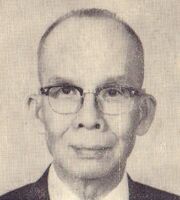Luk, C.: Difference between revisions
No edit summary |
m (Text replacement - "{{Footer}}" to "") |
||
| Line 39: | Line 39: | ||
|classification=People | |classification=People | ||
}} | }} | ||
Latest revision as of 14:38, 5 June 2024
| PersonType | Category:Translators |
|---|---|
| FirstName / namefirst | Charles |
| LastName / namelast | Luk |
| MainNamePhon | Charles Luk |
| MainNameChi | 陸寬昱 |
| MainNamePin | Lu K'uan Yü |
| SortName | Luk, Charles |
| bio | Charles Luk (1898-1978) (simplified Chinese: 陆宽昱; traditional Chinese: 陸寬昱; pinyin: Lù Kuānyù; Wade–Giles: Lu K'uan Yü; Jyutping: Luhk Fūn-Yūk) was an early translator of Chinese Buddhist texts and commentaries into the English language. He was born in Guangdong province, and moved later to Hong Kong, where he wrote most of his books.
Charles Luk often used the title Upāsaka (居士), e.g. "Upāsaka Lu K'uan Yü" (陸寬昱居士), referring to his role as a devout lay follower of Buddhism. His first Buddhist teacher was a tulku of Esoteric Buddhism, the Khutuktu of Xikang. Later he became a disciple of Hsu Yun, the famous inheritor of all five houses of the Chán school in China.[1] Master Hsu Yun personally asked Charles Luk to translate key Chinese Buddhist texts into English, so that Western Buddhists could have access to authentic teachings to assist their practice. Upon his death in 1978, this task was taken on by his British disciple Richard Hunn (1949–2006), also known as Upasaka Wen Shu - who edited the 1988 Element edition of Charles Luk's book entitled Empty Cloud: The Autobiography of the Chinese Zen Master Xu Yun. Charles Luk contributed broadly to Buddhist publications in India, London, Paris, and New York. Translations:
Other works:
|
| YearBirth | 1898 |
| YearDeath | 1978 |
| BornIn | Guangdong province |
| religiousaffiliation | Chan |
| Other wikis |
If the page does not yet exist on the remote wiki, you can paste the tag |

